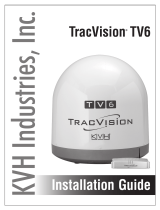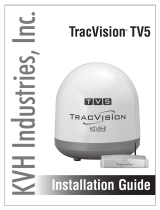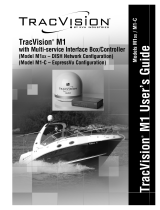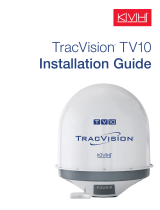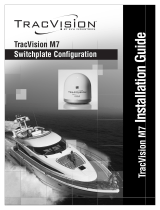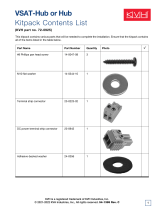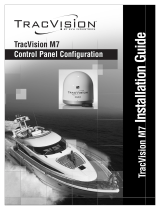Page is loading ...

owner’s
manual
•Guide to Operation
•Guide to Technical Information
A Guide to TracVision
®
G8
TVG8_OM_BinderCover_11.05

*
*
*
*
*
*
*
Notes
* Press any button to return.
** If GPS is providing valid position
data to the antenna, manual entry
of latitude/longitude is not available.
**
2005, KVH Industries, Inc.

TracVision G8
Owner’s Manual Addendum
(ECO #7866)
The following information applies to Revision E of the
TracVision G8 Owner’s Manual (KVH Part Number 54-0198).
Power Requirement for Extended Data/Power Cable
The TracVision G8 antenna system comes with a 100 ft (30 m)
data/power cable. This cable supplies operating power from the
Master Control Unit (MCU) to the antenna.
If you need to use a data/power cable longer than 100 ft (30 m),
the power input to the MCU must measure at least 12 VDC. This
minimum voltage level is necessary due to the added resistance
of the extended length of cable. The power supply must also be
capable of supplying 90 watts to the antenna. Be sure to confirm
that the vessel’s power supply meets these mininum power
requirements before you install the TracVision G8.
1
54-0198 Addendum to Rev. E

TracVision G8
Owner’s Manual
This manual provides detailed instructions on the proper
operation, installation, configuration, troubleshooting, and
maintenance of the KVH TracVision G8 satellite TV system. For
operation instructions, refer to the Guide to Operation. For
installation, configuration, troubleshooting, and maintenance
instructions, refer to the Guide to Technical Information.
Throughout this manual, important information is marked for
your attention by these icons:
Direct questions, comments, or suggestions to:
KVH Industries, Inc. KVH Europe A/S
50 Enterprise Center Kokkedal Industripark 2B
Middletown, RI 02842-5279 USA 2980 Kokkedal, Denmark
Tel: +1 401 847-3327 Tel: +45 45 160 180
Fax: +1 401 849-0045 Fax: +45 45 160 181
Internet: www.kvh.com Internet: www.kvh.com
Please e-mail your comments about this manual to
[email protected]. Your feedback is greatly appreciated!
A helpful tip that either directs you to
a related area within the manual or
offers suggestions on getting the
best performance from your system.
An alert to important information
regarding procedures, product
specifications, or product use.
An electrical safety warning to help
identify electrical issues that can be a
hazard to either this KVH product or
a user.
Information about installation,
maintenance, troubleshooting, or
other mechanical issues.
KVH Part # 54-0198 Rev. E
© 2005-2006 KVH Industries, Inc., All rights reserved.
TracVision G8 Serial Number
This serial number will be required
for all troubleshooting or service
calls made regarding this product.
Welcome to TracVision G8

TracVision®and KVH®are trademarks of KVH Industries, Inc.
DVB®(Digital Video Broadcasting) is a registered trademark of the DVB Project.
DIRECTV®is a registered trademark of DIRECTV, Inc.
DISH Network™is an official trademark of
EchoStar Communications Corporation.
ExpressVu is a property of Bell ExpressVu, a wholly owned
subsidiary of Bell Satellite Services.

54-0198
i
Table of Contents
Table of Contents
Guide to Operation . . . . . . . . . . . . . . . . . . . . . . . . . . . . . . . . . .1
1 System Overview . . . . . . . . . . . . . . . . . . . . . . . . . . . . . . . . . . . . . . . .3
2 Receiving Satellite Signals . . . . . . . . . . . . . . . . . . . . . . . . . . . . . . . .5
3 Turning On the System . . . . . . . . . . . . . . . . . . . . . . . . . . . . . . . . . . .6
4 Changing Channels and Switching to the Second Satellite . . . . .6
5 Watching Television . . . . . . . . . . . . . . . . . . . . . . . . . . . . . . . . . . . . . .8
6 Using the MCU Interface . . . . . . . . . . . . . . . . . . . . . . . . . . . . . . . . . .9
Guide to Technical Information . . . . . . . . . . . . . . . . . . . . . . . .11
1 Introduction . . . . . . . . . . . . . . . . . . . . . . . . . . . . . . . . . . . . . . . . . . .13
1.1 System Overview . . . . . . . . . . . . . . . . . . . . . . . . . . . . . . . . . .15
1.2 System Components . . . . . . . . . . . . . . . . . . . . . . . . . . . . . . .17
1.3 Materials Provided with the TracVision G8 . . . . . . . . . . . . . . .18
2 Installation . . . . . . . . . . . . . . . . . . . . . . . . . . . . . . . . . . . . . . . . . . . .19
2.1 Planning the Installation . . . . . . . . . . . . . . . . . . . . . . . . . . . . .21
2.2 Mounting the TracVision Antenna . . . . . . . . . . . . . . . . . . . . . .26
2.3 Connecting the Receiver(s) . . . . . . . . . . . . . . . . . . . . . . . . . .31
2.4 Wiring the MCU . . . . . . . . . . . . . . . . . . . . . . . . . . . . . . . . . . .35
2.5 Mounting the MCU . . . . . . . . . . . . . . . . . . . . . . . . . . . . . . . . .38
2.6 Activating/Programming the Receiver . . . . . . . . . . . . . . . . . . .40
2.7 Installing Satellites Using the MCU . . . . . . . . . . . . . . . . . . . .42
2.8 Checking Out the System . . . . . . . . . . . . . . . . . . . . . . . . . . . .52
2.9 Changing Geographic Location . . . . . . . . . . . . . . . . . . . . . . .54
3 Using the MCU Interface . . . . . . . . . . . . . . . . . . . . . . . . . . . . . . . . .57
3.1 Startup and Self-test . . . . . . . . . . . . . . . . . . . . . . . . . . . . . . . .59
3.2 Main Display and Accessing the Main Menu . . . . . . . . . . . . .60
3.3 Installing Satellites . . . . . . . . . . . . . . . . . . . . . . . . . . . . . . . . .62
3.4 Restarting the Antenna . . . . . . . . . . . . . . . . . . . . . . . . . . . . . .64
3.5 Operations Mode . . . . . . . . . . . . . . . . . . . . . . . . . . . . . . . . . .64

54-0198
ii
TracVision G8 Owner’s Manual
4 Troubleshooting . . . . . . . . . . . . . . . . . . . . . . . . . . . . . . . . . . . . . . . .83
4.1 Troubleshooting Matrix . . . . . . . . . . . . . . . . . . . . . . . . . . . . . .85
4.2 Causes and Remedies for Common
Operational Issues . . . . . . . . . . . . . . . . . . . . . . . . . . . . . . . . .86
4.3 Receiver Troubleshooting . . . . . . . . . . . . . . . . . . . . . . . . . . . .89
4.4 Antenna Gyro and LNB Faults . . . . . . . . . . . . . . . . . . . . . . . .89
4.5 Computer Diagnostics . . . . . . . . . . . . . . . . . . . . . . . . . . . . . .90
4.6 Maintenance Port Antenna Commands . . . . . . . . . . . . . . . . .91
5 Maintenance . . . . . . . . . . . . . . . . . . . . . . . . . . . . . . . . . . . . . . . . . . .93
5.1 Warranty/Service Information . . . . . . . . . . . . . . . . . . . . . . . . .95
5.2 Preventive Maintenance . . . . . . . . . . . . . . . . . . . . . . . . . . . . .95
5.3 TracVision G8 Field Replaceable Units . . . . . . . . . . . . . . . . .96
5.4 Accessing Antenna Components Through the Hatch . . . . . . .98
5.5 Replacing the PCB Module Fuse . . . . . . . . . . . . . . . . . . . . . .98
5.6 Replacing the PCB Module . . . . . . . . . . . . . . . . . . . . . . . . . .99
5.7 Replacing the RF PCB . . . . . . . . . . . . . . . . . . . . . . . . . . . . .101
5.8 Replacing the Internal Sensor . . . . . . . . . . . . . . . . . . . . . . .103
5.9 Replacing the Azimuth Gyro . . . . . . . . . . . . . . . . . . . . . . . . .104
5.10 Replacing the Elevation Gyro . . . . . . . . . . . . . . . . . . . . . . . .106
5.11 Replacing the Azimuth Motor . . . . . . . . . . . . . . . . . . . . . . . .107
5.12 Replacing the Azimuth Belt . . . . . . . . . . . . . . . . . . . . . . . . .109
5.13 Replacing the Elevation Motor . . . . . . . . . . . . . . . . . . . . . . .110
5.14 Replacing the Elevation Belt . . . . . . . . . . . . . . . . . . . . . . . . .112
5.15 Replacing the Skew Motor . . . . . . . . . . . . . . . . . . . . . . . . . .113
5.16 Replacing the Skew Belt . . . . . . . . . . . . . . . . . . . . . . . . . . . .116
5.17 Replacing the LNB . . . . . . . . . . . . . . . . . . . . . . . . . . . . . . . .117
5.18 Replacing the LNB/Feed Tube Assembly . . . . . . . . . . . . . . .118
5.19 Preparing for Shipment . . . . . . . . . . . . . . . . . . . . . . . . . . . . .120

Appendices . . . . . . . . . . . . . . . . . . . . . . . . . . . . . . . . . . . . . . . . . . . . . . . .121
A System Specifications . . . . . . . . . . . . . . . . . . . . . . . . . . . . . .123
B MCU Flush Mount Panel Template . . . . . . . . . . . . . . . . . . . .125
C Startup Data Sequence . . . . . . . . . . . . . . . . . . . . . . . . . . . .127
D Maintenance Port Antenna Commands . . . . . . . . . . . . . . . .129
Index
54-0198
iii
Table of Contents

Guide to Operation
54-0198 1
Contents
1 System Overview . . . . . . . . . . . . . . . . . . . . . . . . . . . . . . . . . . . . . . . . .3
2 Receiving Satellite Signals . . . . . . . . . . . . . . . . . . . . . . . . . . . . . . . . . .5
3 Turning On the System . . . . . . . . . . . . . . . . . . . . . . . . . . . . . . . . . . . . .6
4 Changing Channels and Switching to the Second Satellite . . . . . . . . . .6
5 Watching Television . . . . . . . . . . . . . . . . . . . . . . . . . . . . . . . . . . . . . . .8
6 Using the MCU Interface . . . . . . . . . . . . . . . . . . . . . . . . . . . . . . . . . . .9
Guide to Operation
This guide explains everything you need to know to operate your
TracVision G8 system. For detailed installation, configuration,
troubleshooting, and maintenance information, please refer to the
Guide
to Technical Information
beginning on page 11.

Guide to Operation
54-0198 3
1 System Overview
A complete satellite TV system, illustrated in Figure 1, includes
the TracVision G8 antenna unit connected to the Master Control
Unit (MCU), a satellite TV receiver (integrated receiver/decoder,
or IRD), and a television set.
Figure 1
TracVision G8 System Diagram
Satellite Compatibility
The TracVision G8 is fully compatible with Digital Video
Broadcasting (DVB®) satellites, as well as DIRECTV®‘s Digital
Satellite Service (DSS) satellites.
In-motion Tracking
The TracVision G8 uses a state-of-the-art actively stabilized
antenna system. The antenna’s built-in global positioning system
(GPS) allows the system to calculate the precise direction to the
satellite from your vessel’s current location, ensuring the shortest
possible satellite acquisition time. Once the satellite is acquired,
the antenna gyros continuously measure the motion of your
vessel and send commands to the antenna motors to keep the
antenna pointed at the satellite at all times.
Receiver 2
Receiver 1
Options Purchased Separately
Master Control
Unit (MCU)
TracVision G8 Antenna
PC Diagnostics
9-36 VDC
90 Watts
RF
TV 1
TV 2
RF
Power/Data
TracVision
TracVision G8 systems equipped
with linear quad LNBs (used in
Mexico and Europe) can be
connected to four receivers using
four RF cables.

54-0198
4
TracVision G8 Owner’s Manual - Guide to Operation
Satellite Library
Your TracVision G8 includes a pre-programmed library of TV
satellites from around the world. If the satellite service you wish
to receive is not already in the satellite library, an authorized
technician can add two additional satellites of your choice to the
library.
System Components
Your TracVision G8 system includes the following components:
Antenna Unit
The antenna unit houses the antenna positioning mechanism, low
noise block converter (LNB), GPS, and three-axis sensor within a
molded ABS radome. Systems equipped with a linear quad LNB
(used in Europe, Australia, and Mexico) include a skew control
mechanism that automatically adjusts the LNB’s skew to account
for regional changes and different satellite services. Power, signal,
and control cabling from belowdecks units are connected to the
antenna at the rear of the baseplate.
Master Control Unit (MCU)
The MCU is the user interface, providing access to the system
and its functions through an LCD and three buttons. The MCU
also serves as the system’s junction box, allowing the system to
use ship’s power and supply and receive data to/from the
TracVision G8. The MCU can accept any power input between
9 and 36 volts DC; its power supply provides power to the
antenna and galvanically isolates the TracVision G8 system.
Satellite TV Receiver (IRD) – Sold Separately
The receiver (purchased separately) receives satellite signals from
the antenna unit for signal processing and channel selection, and
sends the signals to the TV set for viewing. Please refer to the
user’s manual provided with your selected receiver for complete
operating instructions.

Guide to Operation
54-0198 5
2 Receiving Satellite Signals
For TracVision G8 to receive satellite TV signals, the antenna
must have a clear line of sight to the satellite. If you only receive
intermittent signals or the antenna cannot find the satellite, check
around your vessel for any objects that could be blocking the
signal, such as other vessels, trees, buildings, other onboard
equipment, etc.
Figure 2
Satellite Blockage
You must also be located within the selected satellite’s coverage
area in order to receive its signal. Refer to your satellite television
service manual to check the viable coverage area. For your
convenience, KVH provides links to several web sites that offer satellite
coverage information. Simply go to our web site at: www.kvh.com/
footprint.
TracVision

54-0198
6
TracVision G8 Owner’s Manual - Guide to Operation
The satellite configuration on
your receiver must match the
satellite setting on the
TracVision G8 system.
Satellite A on the TracVision G8
must be the same satellite as
receiver Alternative 1 (or A, based
on your receiver) and must be
assigned the receiver DiSEqC 1
setting.*
Satellite B on the TracVision G8
must be the same satellite as
receiver Alternative 2 (or B, based
on your receiver) and must be
assigned the receiver DiSEqC 2
setting.*
Refer to your receiver user manual
for complete instructions for your
receiver.
*DiSEqC settings only apply to
European systems and DIRECTV
DSS Plus™receivers.
3 Turning On the System
To use the TracVision G8 system, follow the steps below. To
minimize the time it takes the antenna to acquire the satellite, do not
change the channel during this process.
1. Turn on the receiver and the television. (Refer to your
receiver user’s manual for complete operating
instructions for the receiver.)
2. Apply power to the TracVision G8 antenna.
3. Minimize turning the vessel for two minutes after turning
on the antenna to allow the antenna gyros to initialize
properly.
4 Changing Channels and
Switching to the Second Satellite
TracVision G8 can have a pair of satellites installed, either one of
which can be the active satellite selection. There are several
methods of selecting whether your TracVision G8 will track
Satellite A or Satellite B based upon your location, type of install,
receiver, and selected satellite service.
Europe and Australia
If you are not using a multiswitch, switching from one satellite to
the other is as easy as changing the channel using the receiver’s
remote control. TracVision G8 will automatically switch between
the two satellites as necessary to receive your selected channel. If
you are using a multiswitch, however, you will need to use the
MCU switching option described in “Switching Satellites Using the
MCU” on page 7.
North America
DIRECTV Subscribers
DIRECTV subscribers in certain regions of the United States will
require a DSS Plus™receiver to receive broadcasts from multiple
satellites. If connected to the antenna’s RF1 connector, the DSS
Plus receiver allows you to switch channels using the receiver’s
remote control. If you are a DIRECTV subscriber, but do not have
a DSS Plus receiver, or you are using a multiswitch, use the MCU
switching option described in “Switching Satellites Using the
MCU” on page 7.

Guide to Operation
54-0198 7
DISH Network
™
(EchoStar) and ExpressVu Satellite Subscribers
DISH Network and ExpressVu subscribers will need to use the
MCU switching option, as described in “Switching Satellites Using
the MCU.”
Latin America
In Latin America, including Mexico, satellite switching is
unnecessary because programming is broadcast from a single
satellite.
Switching Satellites Using the MCU
If you’re unable to switch between satellites using the receiver’s
remote control, use the MCU front panel buttons to select
between Satellite A and Satellite B. Press the left button to select
Satellite A and the right button to select Satellite B.
Figure 3
Switching Satellites Using the MCU
Tracking <SAT NAME>
Sat A Menu Sat B
Track Installed
Satellite A
Track Installed
Satellite B
Europe only:
Using the MCU to switch between
satellites disables the system’s
DiSEqC monitoring. You will not be
able to use the receiver/remote to
switch between satellites unless the
system is restarted.

54-0198
8
TracVision G8 Owner’s Manual - Guide to Operation
5 Watching Television
TracVision G8 will receive satellite TV signals whether your
vessel is in motion or at rest.
Cable Unwrap
If your vessel makes several consecutive circles in the same
direction, the antenna will rotate 720° before reaching the end of
its internal cable. If it does so, the system automatically unwraps
the cable by quickly rotating the dish in the opposite direction.
During this time, your TV picture will freeze momentarily.
Fine-Tuning
You might hear slight mechanical sounds from the antenna, as
the antenna moves continually in a circular motion to sweep
across the satellite’s peak signal. The signal strength is then fed
back to the control circuits to keep pointed in the direction of the
strongest signal.
Sleep Mode
When the vessel has come to a stop and holds its position for one
minute (e.g., at a dock), the antenna enters Sleep Mode, which
locks the antenna in place to conserve power. As soon as the
vessel moves beyond a 1° - 2° window, or the RF level changes
significantly, Sleep Mode automatically turns off and the system
begins tracking the satellite again (or enters Search mode to find
the satellite).
If you prefer, you may disable the
Sleep Mode function. Refer to
“Turning Sleep Mode On/Off” on
page 69
for details.

Guide to Operation
54-0198 9
6 Using the MCU Interface
All TracVision G8 operations are controlled and monitored using
the MCU. An LCD display shows configuration data and three
buttons enable you to perform menu-driven tasks.
Figure 4
MCU Front Panel
During the TracVision G8 installation process, the satellite
selections should have been configured to your specifications as
detailed in the Guide to Technical Information. Once the system is
installed and functioning properly, the system will function
automatically.
However, there may be instances in which you need to access
certain settings or diagnostic tools via the MCU interface. To
assist you, KVH has provided the following information
resources:
Quick Reference Guide:
The quick reference guide on the inside front cover of this
manual illustrates the main display and the overall menu
structure, allowing you to easily and quickly navigate
among the MCU menus.
Section 3 in the Guide to Technical Information:
Section 3, “Using the MCU Interface,” on page 57 of the
Guide to Technical Information provides a detailed
explanation of every menu option and system
configuration setting. These menus should, for the most
part, be accessed by authorized technicians. The following
are the most commonly used menu functions:
Menu Function PurposeSee Page:
Install Satellite Install a satellite to track 62
Set Sleep On/Off Turn Sleep Mode on or off 69
Set Brightness Adjust the MCU display’s brightness 81
LCD Display
Buttons
Tracking <SAT NAME>
Sat A Menu Sat B

Guide to Technical Information
54-0198
11
Contents
1 Introduction . . . . . . . . . . . . . . . . . . . . . . . . . . . . . . . . . . . . . . . . . . . .13
2 Installation . . . . . . . . . . . . . . . . . . . . . . . . . . . . . . . . . . . . . . . . . . . . .19
3 Using the MCU Interface . . . . . . . . . . . . . . . . . . . . . . . . . . . . . . . . . .57
4 Troubleshooting . . . . . . . . . . . . . . . . . . . . . . . . . . . . . . . . . . . . . . . . .83
5 Maintenance . . . . . . . . . . . . . . . . . . . . . . . . . . . . . . . . . . . . . . . . . . . .93
Appendices . . . . . . . . . . . . . . . . . . . . . . . . . . . . . . . . . . . . . . . . . . . . . . . . . .121
Guide to Technical
Information
This guide explains how to install, troubleshoot, and maintain the
TracVision G8 system. For complete operating instructions, please refer
to the
Guide to Operation
at the front of this manual.

Introduction
54-0198
13
1 – Introduction
This section provides a basic overview of the TracVision G8 system. It
explains how the system works and describes the function of each
component.
Contents
1.1 System Overview . . . . . . . . . . . . . . . . . . . . . . . . . . . . . . . . . . . . . .15
1.2 System Components . . . . . . . . . . . . . . . . . . . . . . . . . . . . . . . . . . .17
1.3 Materials Provided with the TracVision G8 . . . . . . . . . . . . . . . . . .18

Introduction
54-0198
15
1.1 System Overview
A complete satellite TV system, illustrated in Figure 1-1, includes
the TracVision G8 antenna unit connected to the Master Control
Unit (MCU), a satellite TV receiver (integrated receiver/decoder,
or IRD), and a television set. While all basic programming and
first-level diagnostic functions are available through the MCU, a
laptop computer can be used to conduct advanced diagnostics.
System specifications are provided in Appendix A on page 123.
Figure 1-1
TracVision G8 System Diagram
Satellite Compatibility
The TracVision G8 satellite antenna is fully compatible with
Digital Video Broadcasting (DVB) satellites, as well as
DIRECTV‘s Digital Satellite Service (DSS) satellites.
In-motion Tracking
The TracVision G8 uses a state-of-the-art actively stabilized
antenna system. The antenna’s built-in global positioning system
(GPS) allows the system to calculate the precise azimuth and
elevation to the satellite from your vessel’s current location,
ensuring the shortest possible satellite acquisition time. Once the
satellite is acquired, the antenna gyros continuously measure the
heading, pitch, and roll of your vessel and send commands to the
antenna motors to keep the antenna pointed at the satellite at all
times.
TracVision
TracVision G8 systems equipped
with linear quad LNBs (used in
Mexico and Europe) can be
connected to four receivers using
four RF cables.
Receiver 2
Receiver 1
Options Purchased Separately
Master Control
Unit (MCU)
TracVision G8 Antenna
PC Diagnostics
9-36 VDC
90 Watts
RF
TV 1
TV 2
RF
Power/Data

Satellite Library
Your TracVision G8 includes a pre-programmed library of TV
satellites from around the world. When configuring the
TracVision G8, you may choose a pair of satellites from the
library to be active in the system and with your receiver. If the
satellite service you wish to receive is not listed in the satellite library,
you may add two additional satellites of your choice to the library.
North America
Any two of the North American satellites listed below can be
paired together, as long as the satellites are within range of the
antenna (standard circular dual LNB required):
Europe
Any two of the European satellites listed below can be paired
together, as long as the satellites are within range of the antenna
(linear quad LNB/feed tube assembly required):
Mexico
In Mexico, select the satellite listed below for Sky Mexico service
(linear quad LNB/feed tube assembly required).
• PAS_9
54-0198
16
TracVision G8 Owner’s Manual - Guide to Technical Information
TracVision G8’s default satellite
pairs are:
N. America (US DIRECTV):
DSS_101 & DSS_119
Europe:
ASTRA1 & HOTBIRDWB
Mexico (Sky Mexico):
PAS_9 & NONE
L. America (DIRECTV LA):
GALAXY3CN & NONE
• Astra1 • Sirius
• Astra2N •Thor
• Astra2S • Arabsat
• Hispasat • Nilesat
• HotbirdWB • Turksat
• Hotbird • Eutel_W3A
• DSS_72 • Echo_110
• DSS_101 • Echo_119
• DSS_110 • Echo_148
• DSS_119 • Expressvu
• Echo_61 • ExpressTV
/
